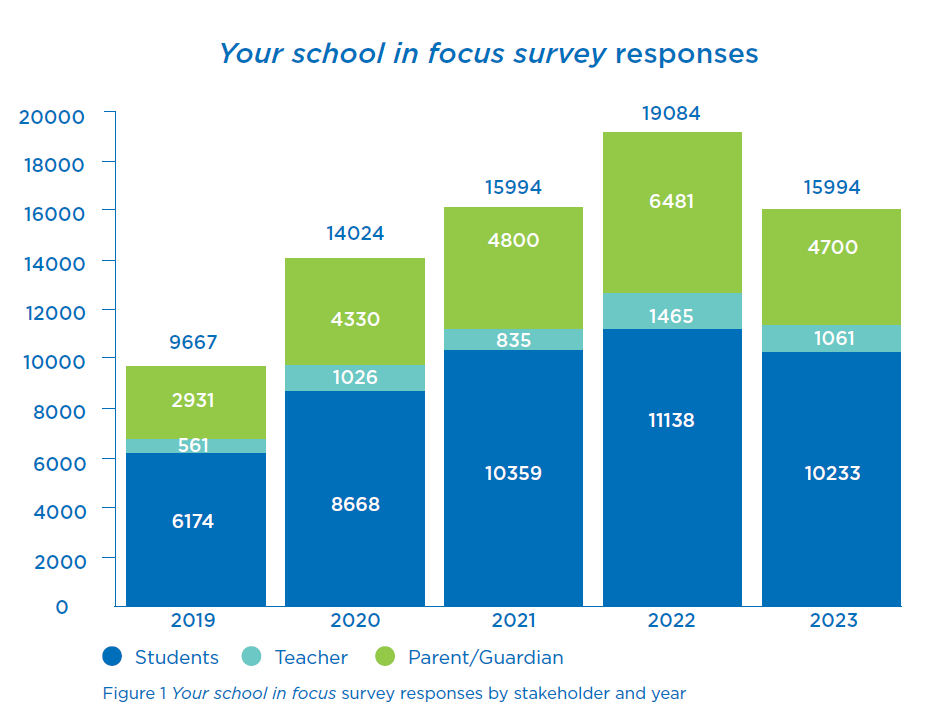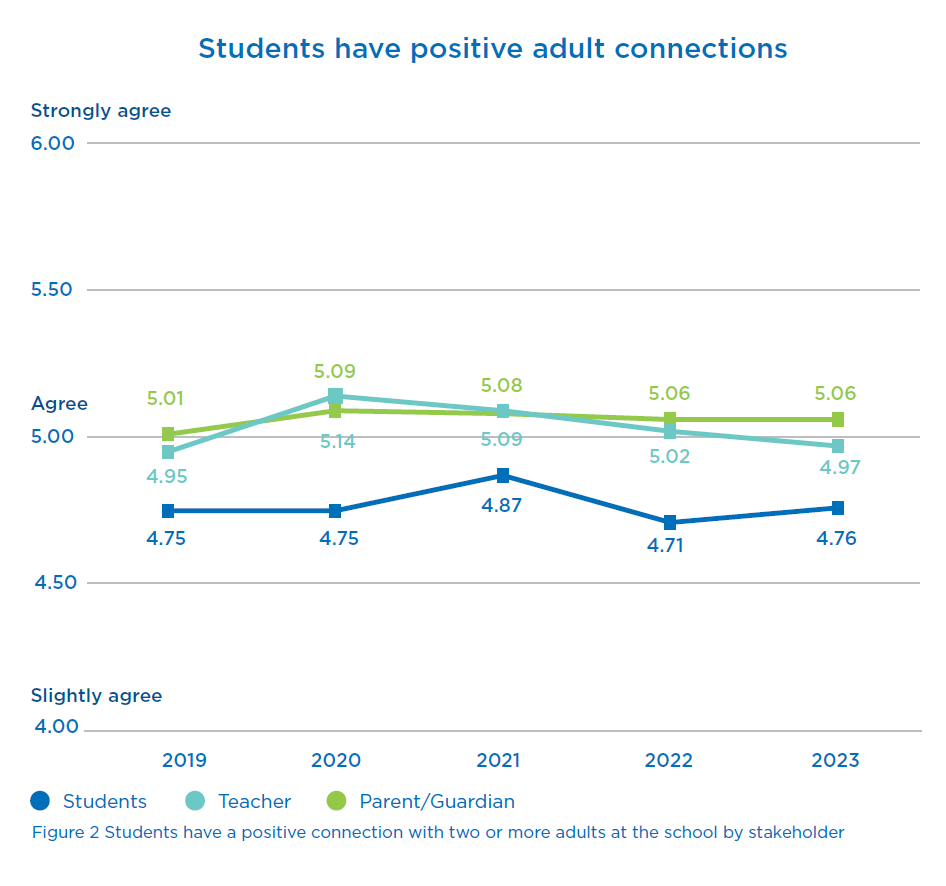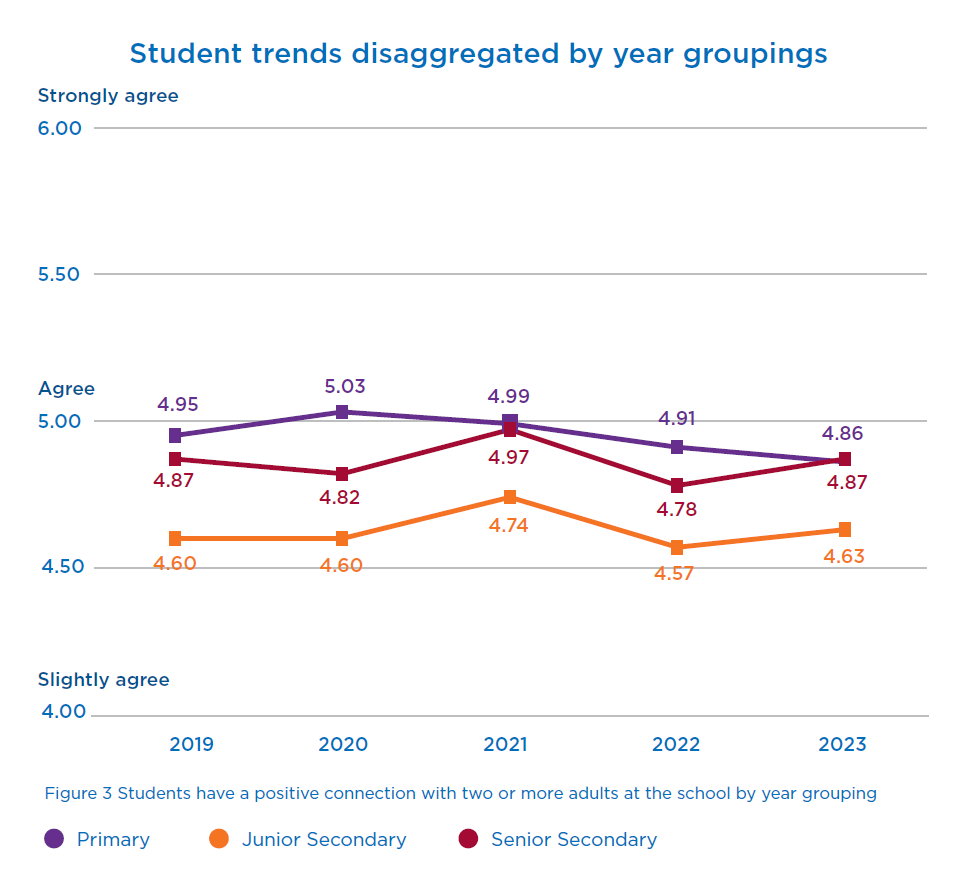Student wellbeing is well known to contribute significantly to students' potential to flourish at school. To what extent though is a student's overall wellbeing influenced by the relationships they have with the adults in their lives? A recent study by AISNSW offers some insights.
The Perspectives: Your school in focus survey, conducted by AISNSW over the past five years, has amassed 74,763 responses from diverse stakeholders as shown in Figure 1. Analysing this substantial dataset reveals valuable insights into a wide range of factors relevant for decision-making in schools including student wellbeing. This first article in a series exploring insights from the Perspectives: Your school in focus survey data, focuses on the role of students’ relationships with adults, an important contributor to young people’s wellbeing.

FIGURE 1 YOUR SCHOOL IN FOCUS SURVEY RESPONSES BY STAKEHOLDER AND YEAR
Research consistently emphasises that student wellbeing is intertwined with their connections to adults at school. Supportive relationships foster a sense of belonging and resilience, which are pivotal for students' overall wellbeing and academic success. Perspectives survey data underscores this, showing that teachers and parents generally perceive student-adult relationships more positively than students do themselves as illustrated in Figure 2. This perception gap is significant and warrants attention.

FIGURE 2 STUDENTS HAVE A POSITIVE CONNECTION WITH TWO OR MORE ADULTS AT THE SCHOOL BY STAKEHOLDER
Most schools prioritise opportunities for every student to form positive connections with at least one adult. Further questions for consideration might include: How can school leaders ensure every student has a positive connection with an adult? What opportunities exist to cultivate these connections? How might assigning core teachers in Junior Secondary facilitate sustained relationships?
A downward trend in teacher sentiment since 2020 raises some concerns (Figure 2). The peak in 2020, potentially linked to increased support during the COVID-19 pandemic, suggests that current support systems may need re-evaluation. Schools monitoring the effectiveness of their wellbeing initiatives, will potentially need to balance resources such as time and expertise.
Graham et al. (2023) highlighted that ethical structures and practices, such as designated wellbeing leaders and restorative practices, are crucial for supporting student wellbeing. However, increasing administrative burdens on teachers can hinder relationship-building. Reducing these responsibilities may allow teachers to focus more on fostering positive relationships with students.
Positive relationships were identified by Graham et al. (2023) as essential for safety and wellbeing. Respect, care, and trust were key components. Students valued adults who invested in meaningful relationships, listened to their voices, and encouraged participation in class activities. Leadership that models positive relationships significantly impacts student safety and wellbeing.
Despite the presence of trained staff, Runions and Cross (2022) found that adolescents are more likely to seek support from friends, parents, and the internet before turning to adults at school. This suggests it may be worthwhile for schools to reflect on and consider implications related to staffing and wellbeing systems.
In Figure 3, disaggregated Perspectives survey data reveal that students in Junior Secondary (years 7-9) have lower positive perceptions about their connections with adults in comparison to Primary and Senior Secondary students. To address this, Davis et al. (2022) recommend that teachers emphasise students' strengths by personalising feedback according to their competencies, focusing on post-school career options during lessons, and minimising punitive strategies. These approaches can enhance students' relationships with adults, fostering autonomy and engagement at school.

FIGURE 3 STUDENTS HAVE A POSITIVE CONNECTION WITH TWO OR MORE ADULTS AT THE SCHOOL BY GRADE GROUPING
The Perspectives: Your school in focus survey provides valuable insights into the importance of student-adult relationships for student wellbeing. Schools should prioritise creating environments where students feel valued and supported by adults, thereby enhancing both their current educational experience and future success.
If interested in utilising this data for identifying strategic priorities, schools can contact Tiffany Roos, Director: The Evidence Institute, for further information.
References
Davis, M. H., Spring, C. L., & Balfanz, R. W. (2022). Engaging high school students in learning. In A. L. Reschly & S. L. Christenson (Eds), Handbook of research on student engagement (pp. 563–586). Springer International Publishing. https://doi.org/10.1007/978-3-031-07853-8_27
Graham, A., Canosa, A., Boyle, T., Moore, T., Taylor, N., Anderson, D., & Robinson, S. (2023). Promoting students’ safety and wellbeing: ethical practice in schools. Australian Educational Researcher, 50(5), 1477–1496. https://doi.org/10.1007/s13384-022-00567-8
Runions, D. K., & Cross, D. (2022). Student and staff wellbeing and mental health. Independent Schools Australia. https://isa.edu.au/wp-content/uploads/2022/06/Student-and-staff-wellbeing-report.pdf